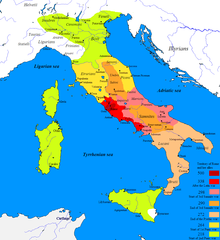Quintus Publilius Philo: Difference between revisions
word order |
→Career: The content was slightly inaccurate. It described Hortensius' law as earlier when the law was passed in 287BC. Tags: Mobile edit Mobile web edit |
||
| Line 11: | Line 11: | ||
#At least one censor must be a pleb. |
#At least one censor must be a pleb. |
||
The first of the three laws duplicates |
The first of the three laws duplicates a later measure enacted by [[Quintus Hortensius (dictator)|Quintus Hortensius]]. It is probably fictitious.<ref name="WhosWho" /> |
||
During his first consulship in 339 BC, Publilius celebrated a triumph for a victory over the [[Latins (Italic tribe)|Latins]]. Tiberius Aemilius Mamercinus, his fellow consul, was so jealous that he abandoned the war against the Latins and returned to Rome to demand a triumph for himself.<ref>Livy, 8.12.7–9.</ref> |
During his first consulship in 339 BC, Publilius celebrated a triumph for a victory over the [[Latins (Italic tribe)|Latins]]. Tiberius Aemilius Mamercinus, his fellow consul, was so jealous that he abandoned the war against the Latins and returned to Rome to demand a triumph for himself.<ref>Livy, 8.12.7–9.</ref> |
||
Revision as of 20:56, 16 June 2017

Quintus Publilius Philo was a Roman politician. He was the first historical proconsul. He served four one-year terms as consul: 339, 327, 320, and 315 BC. He was praetor in 336 BC, the first plebeian to serve in this position. He might have also served on a debt relief commission in 352 BC and as dictator in 339 BC.[1]
Career
Livy writes in his History of Rome:
Publilius was a popular dictator, both because of his denunciation of the senate and because he carried through three laws very advantageous to the plebs and prejudicial to the nobles.[2]
These laws were:[2]
- Decisions of the Popular Assembly are binding on all quirites (Roman citizens).
- All measures proposed before the Centuriate Assembly receive senatorial sanction (patrum auctoritas) before being voted on.
- At least one censor must be a pleb.
The first of the three laws duplicates a later measure enacted by Quintus Hortensius. It is probably fictitious.[1]
During his first consulship in 339 BC, Publilius celebrated a triumph for a victory over the Latins. Tiberius Aemilius Mamercinus, his fellow consul, was so jealous that he abandoned the war against the Latins and returned to Rome to demand a triumph for himself.[3]
As censor in 332 BC, Publilius enrolled new Latin citizens and created the tribes of Maecia and Scaptia. He besieged Naples and Palaepolis in 327–326 during his second consulship. His term as consul expired during the siege. The Assembly extended Publilius' command by appointing him proconsul. He thus became the first Roman to hold this position. He secured the surrender of both cities with the help of friendly elements and celebrated a second triumph in 326 BC.[1]
After the Samnites humiliated a Roman army at Caudine Forks in 321 BC, the Romans granted Publilius a third consulship, together with Lucius Papirius Cursor. (This was Cursor's second consulship.) This was "a choice universally approved, for there were no commanders at that time of higher reputation," according to Livy.[4] Publilius again served with Cursor for a fourth and final consulship in 315 BC.[1]
References
- ^ a b c d Drummond, Andrew, "Publilius Philo, Quintus" in Who's Who in the Classical World, January 2003, ISBN 9780192801074.
- ^ a b Livy, History of Rome, 8.12.14–16.
- ^ Livy, 8.12.7–9.
- ^ Livy 9.7.15.
